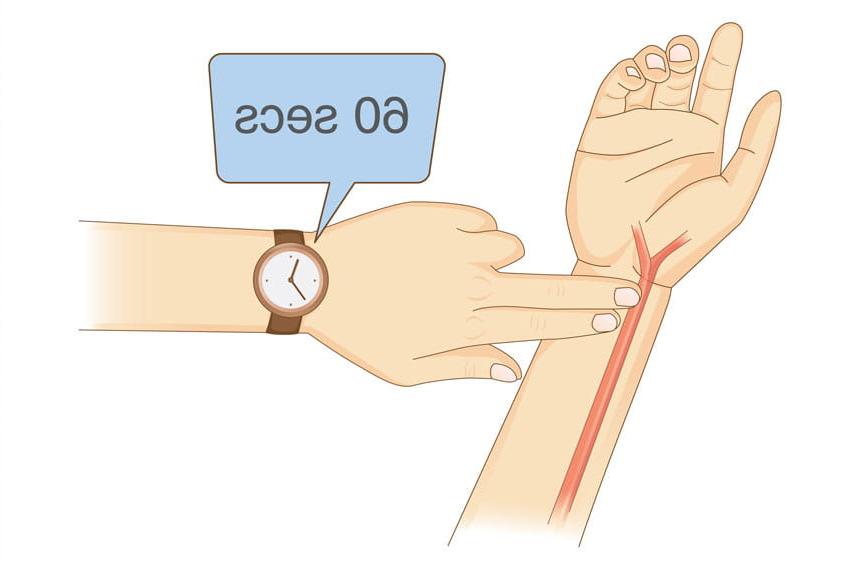关于心率
What's the difference between 血压 and 心率?
When learning about high 血压, you might see 心率 mentioned in relation to exercise.
你的 血压 is the force of your blood while moving through your vessels.
你的 心率 is the number of times your heart beats per minute. 你的心率通常被称为脉搏.
关于心率,你应该知道些什么?
Understanding your 心率 can help you monitor your fitness level and heart health. 它甚至可以帮助你发现健康问题.
心率的变化可能表明 心脏病 or other health problems, especially as you age.
心率,血压和运动
你的 目标心率 is based on age and can help you check the intensity of your exercise.
- 当你运动时,你的心率会加快. The heart is pumping more blood to deliver oxygen to your working muscles.
- 你的 diastolic 血压 (the second number in your 血压 reading) will also rise.
- 当你停止锻炼时, your 心率 does not return to your normal 静息心率 right away.
- The more often you exercise, the sooner your 心率 should return to normal.
如何检查心率是否正常?
最能测出脉搏的地方是:
- 手腕
- 肘部内侧
- 你脖子的两边
- 脚尖

To get the most accurate reading on your wrist:
- Locate the artery on the inner wrist of either arm. Lightly place your index and middle fingers on the artery. 你应该感觉到每一次拍打你的手指.
- 数一数60秒内心跳的次数
你的 静息心率 is the heart pumping the number of times needed to deliver blood to the body when you’re not exercising. A normal 静息心率 is between 60 and 100 beats per minute if you are sitting or lying and you are calm and feeling well.
If you have a 静息心率 lower than 60, you may have 心动过缓. A 心率 lower than 60 doesn’t always signal a medical problem. It could be the result of taking a drug such as a beta blocker or other medication. 运动员心率较低也很常见. That’s because their heart muscle is in good condition and does not need to work as hard. A low amount of physical activity doesn’t usually change the 静息心率 much. 睡觉时心率也可能较低.
If you have a 静息心率 of over 100, you may have 心动过速. A high 心率 isn’t always a sign of a problem. It could be a sign or symptom of another condition that may be temporary.
其他因素如何影响心率
- 温度: Outside temperatures may affect 心率 and an increase in body temperature may increase the 心率.
- 体位: 你的 心率 is usually similar whether you are resting, sitting or standing still. 你的 心率 may go up a little bit when you first stand up. 你的 心率 should go back to normal after a few minutes.
- 练习: 你的 心率 increases with the intensity of the activity you’re doing.
- 情绪: 你的 pulse can increase if you are stressed, anxious, happy or sad. 疼痛也会增加你的心率.
- 体型: People with obesity might have a higher 心率 than people without obesity.
- 药物使用方法: Beta blockers, calcium channel blockers and several other medications can slow your 心率.
什么时候给你的健康护理专家打电话
你的 心率 is just one tool to help get a picture of your health.
Tell your health care professional if you have noticed that your 心率 has been beating slower or faster than usual. You may also have had symptoms such as feeling weak, dizzy or like you might faint.
Call 911 if your 心率 is suddenly very high or very low for you, especially if you have symptoms that may include chest pain, 呼吸急促(气促), 头晕, fainting or other signs that something is not right.
心率和受体阻滞剂
If you’re on a beta blocker to decrease your 心率 (and 降低血压) or to control an abnormal rhythm, you may be asked to monitor and log your 心率. Ask your health care professional when and how often to track your 心率.
Keeping track of your 心率 can help your health care professional decide if:
- 你的剂量需要改变
- 你需要换一种药







